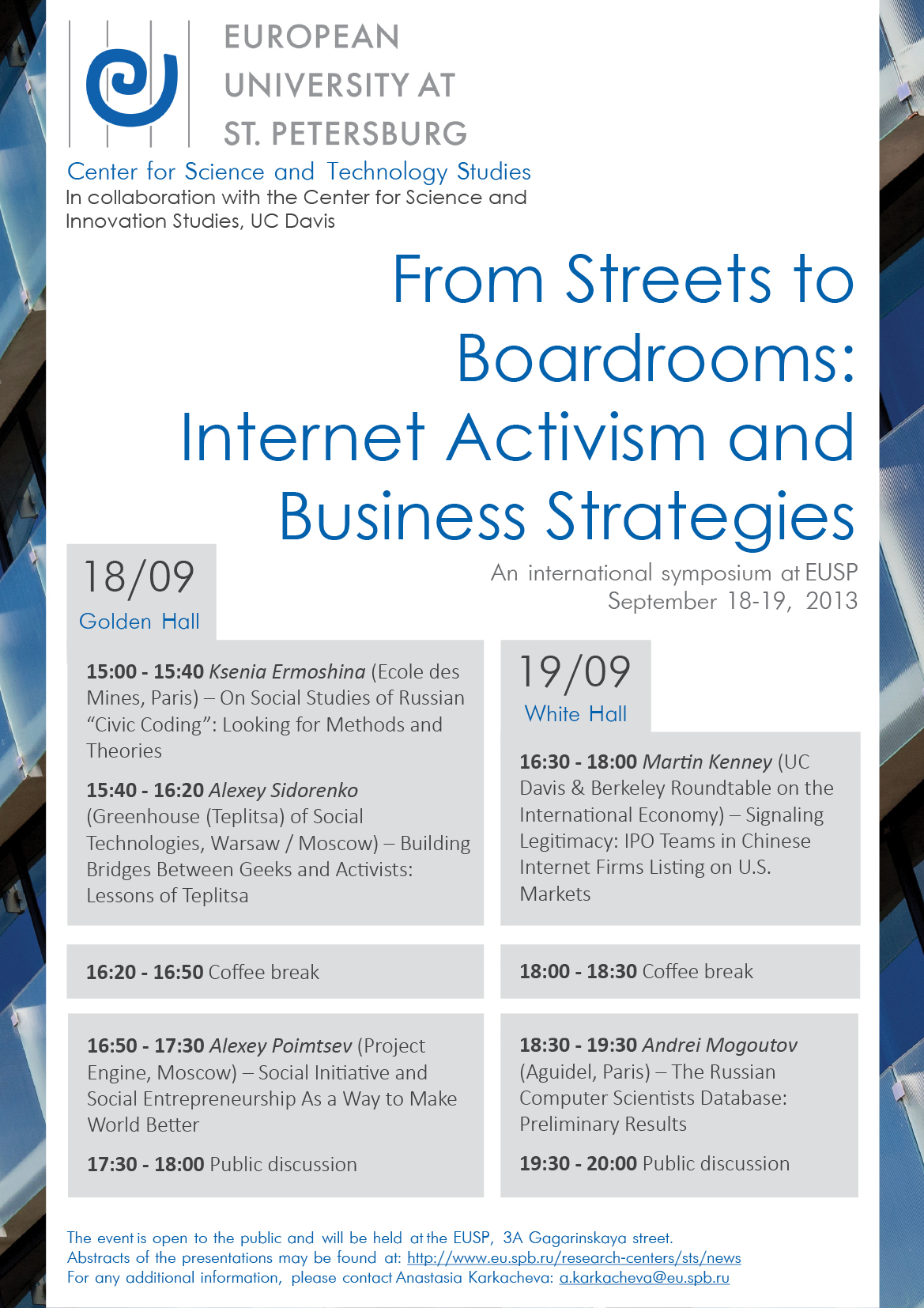An international symposium at EUSP, September 18-19, 2013
 In collaboration with the Center for Science and Innovation Studies, UC Davis
In collaboration with the Center for Science and Innovation Studies, UC Davis
On September 18-19 the STS Center at EUSP held the first public event of "Russian Computer Scientists and their Diasporas" – a project sponsored by a Mega Grant from the Ministry of Education. In this first event we are presenting new research about the role of Internet entrepreneurs and activists in Russia, preliminary results of a comprehensive survey of publications by Russian computer scientists, and an analysis of business models of Internet firms operating in global markets.
Wednesday, September 18, 3PM, Golden Hall
15:00 - 15:40 Ksenia Ermoshina (Ecole des Mines, Paris) – On Social Studies of Russian “Civic Coding”: Looking for Methods and Theories
15:40 - 16:20 Alexey Sidorenko (Greenhouse (Teplitsa) of Social Technologies, Warsaw / Moscow) – Building Bridges Between Geeks and Activists: Lessons of Teplitsa
16:20 - 16:50 Coffee break
16:50 - 17:30 Alexey Poimtsev (Project Engine, Moscow) – Social Initiative and Social Entrepreneurship As a Way to Make World Better
17:30 - 18:00 Public discussion
Thursday, September 19, 4.30PM, White Hall
16:30 - 18:00 Martin Kenney (UC Davis & Berkeley Roundtable on the International Economy) – Signaling Legitimacy: IPO Teams in Chinese Internet Firms Listing on U.S. Markets
18:00 - 18:30 Coffee break
18:30 - 19:30 Andrei Mogoutov (Aguidel, Paris) – The Russian Computer Scientists Database: Preliminary Results
19:30 - 20:00 Public discussion
Abstracts of the papers
KSENIA ERMOSHINA
PhD Candidate, Centre for the Sociology of Innovation, École des Mines, Paris
On Social Studies of Russian "Civic Coding": Looking for Methods and Theories
The so called “civic applications” are software helping citizens to actively participate in social life using their digital devices. As a kind of digital tool of political empowerment, civic applications offer an extremely interesting object of study laying on the border between political sociology, STS and sociology of computer science. Civic applications represent a sort of “crystallization” of a collective work by developers, interface designers and social activists who redefine social challenges and “translate” public demands into a language of code. The analysis of civic applications case-studies allows studying the laboratory of a computer scientist which usually remains “invisible” to a sociologist.
The presentation will be based on observations and in-depth interviews with Russian developers who elaborate civic mobile and web-applications conducted during the first year of the research.
ALEXEY SIDORENKO
CEO, Greenhouse (Teplitsa) of Social Technologies, Warsaw/Moscow
Building Bridges Between Geeks and Activists: Lessons of Teplitsa
Collaboration between programmers and activists can often result in vast and unexpected consequences. This collaboration, however, is not easy to achieve. Teplitsa (Greenhouse) of Social Technologies, a Russia-based incubator of civic applications, whose mission includes creation of the conditions for effective IT/Civil society partnerships, had gone through a long road in a search for the successful formula of such partnerships. Alexey Sidorenko, head of the project, will speak about what's usually being 'lost in translation' in the communication of geeks and activists, about IT-volunteer motivations, success stories and epic fails.
ALEXEY POIMTSEV
CEO, Progress Engine, Moscow
Social Initiative and Social Entrepreneurship As a Way to Make World Better
Social entrepreneurship is a business activity that aims at solving or alleviating different social problems. Social entrepreneurs strive to use innovation approaches and technologies in order to make their businesses profitable and scalable, and also to have an impact on this or that social problem. Social initiative, as opposed to social entrepreneurship, not necessarily has a commercial motive and only aims at making people’s life and social interactions better.
MARTIN KENNEY
Professor, UC Davis & Senior Director, Berkeley Roundtable on the International Economy
Signaling Legitimacy: IPO Teams in Chinese Internet Firms Listing on U.S. Markets
From 1999-2010 120 Chinese emerging growth firms undertook initial public stock offerings on U.S. markets. This provided a remarkable natural experiment for exploring how this class of organizations from a radically different political economy established their legitimacy and how, once established, this legitimacy permitted organizational and personnel flexibility for later firms. The increased legitimacy allowed changes in the backgrounds of the members of the IPO top management team (TMT) and independent members of the board of directors (BoD). We find that overall composition of both the TMT and BoD in terms of experience in the U.S. decreased and “Chinese-ness” increased, but at different rates. For the operational TMT members, U.S. experience decreased dramatically over time, except for the CFO who is the representative of investors within the TMT. Similarly, on the BoD, the venture capitalists continued to have high levels of US experience, while the other independent members tracked the TMT in having less US experience. In this increased legitimacy allows the acceptance of “foreign” operational management, but investors are less lenient in terms of ensuring that their “monitors,” the CFO and venture capitalists, should show evidence, i.e., U.S. experience and background, that they adhere to the investor’s values.
